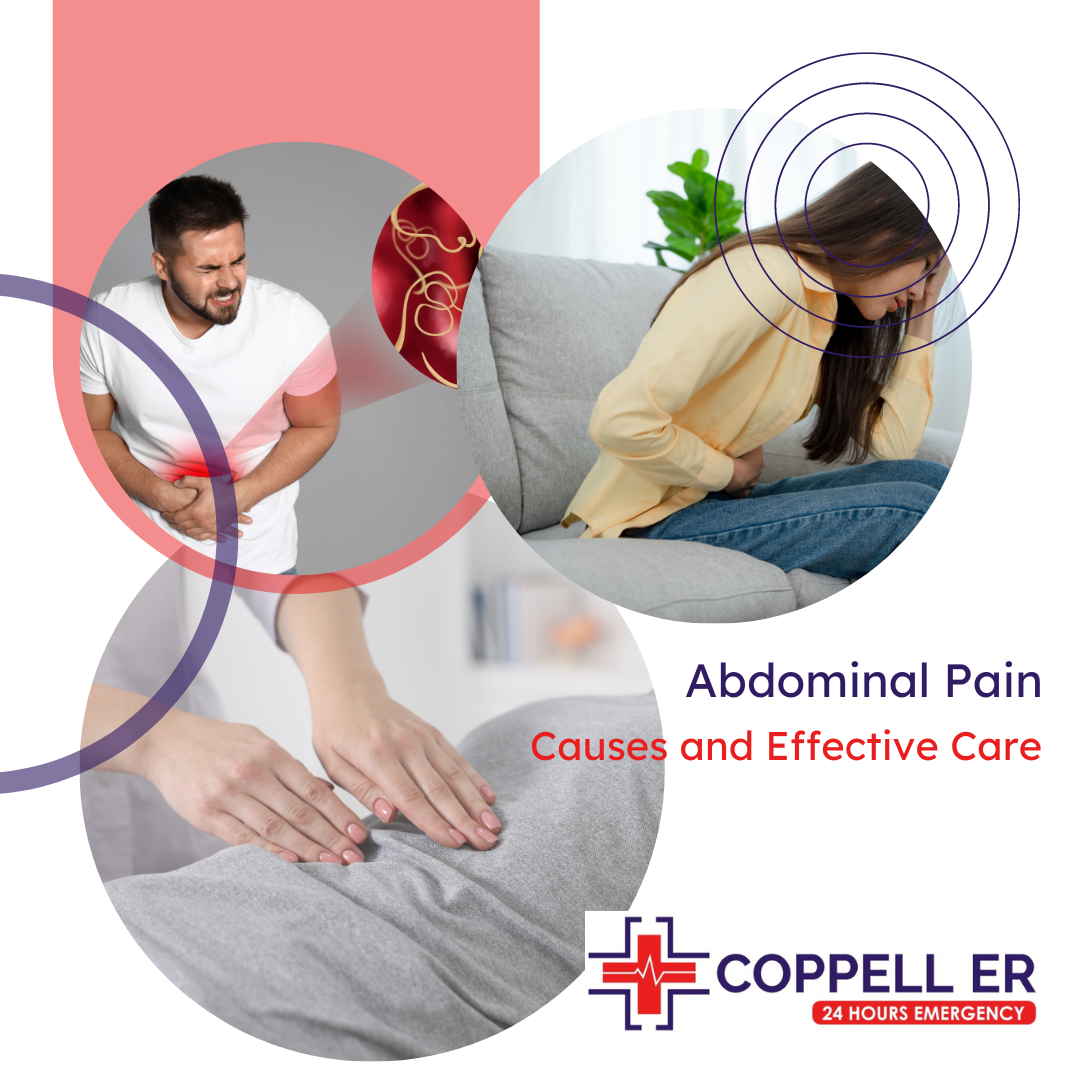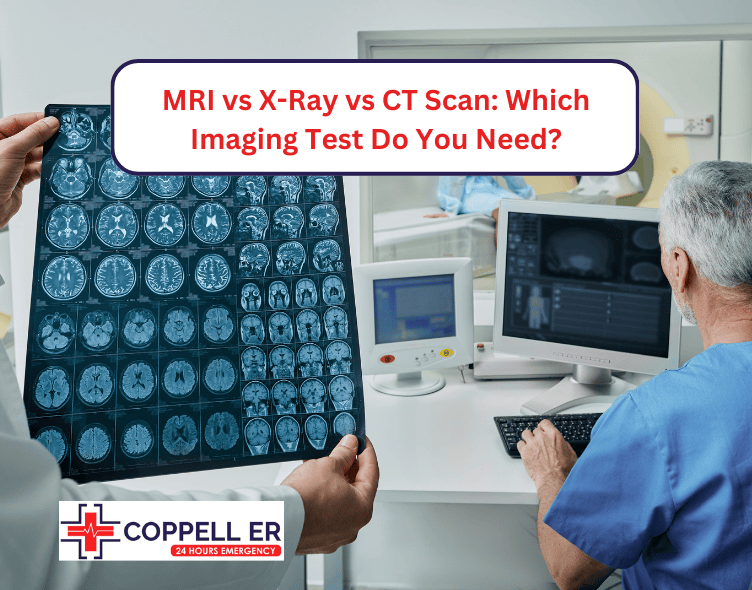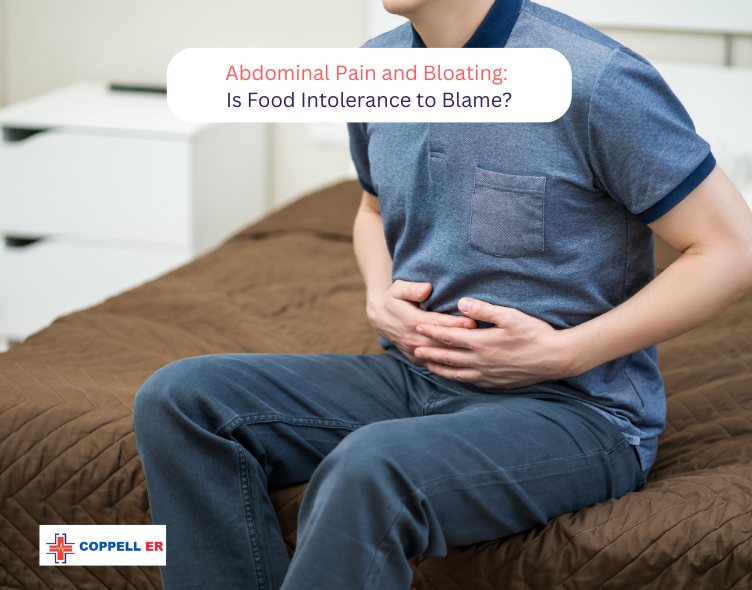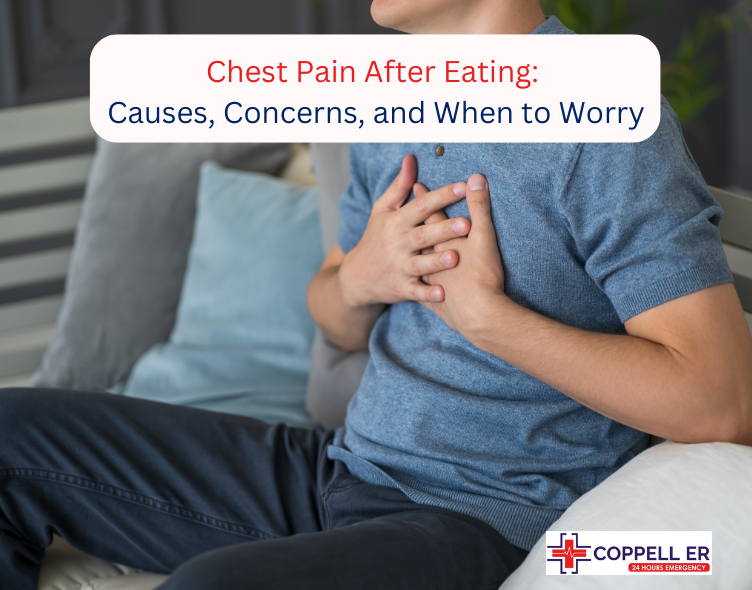Imagine you’re going about your day, and suddenly, a sharp pain grips your insides. It feels like a stinging pain that comes and goes in waves. You feel nauseous, your stomach is in knots, and you don’t even want to move.
The confusion and fear that accompany such experiences can be overwhelming. What does this pain mean, and how can you quickly alleviate it? In moments like these, understanding the causes and knowing the right treatments becomes crucial.
In this guide, we dissect the different types and causes of abdominal pain, explore the available treatments, and discuss effective recovery measures. By gaining this knowledge, you can better assess your symptoms and know when to seek emergency care.
| Pro Tip: If you experience sudden and severe abdominal pain, don’t take chances. It’s essential to consult a healthcare professional immediately. For urgent and expert care, visit Coppell ER where our team is available 24/7 to provide the urgent treatment and peace of mind. |
What is Abdominal Pain?
Pain anywhere in the abdomen area, between the ribs and the pelvis, is referred to as abdominal pain. Although we frequently associate stomach pain or “stomach ache” with Abdominal distress, other organs besides the stomach can also be the source of your discomfort.
Pain in the abdomen can be subtle, sporadic, acute, achy, or crampy. Painful cramps can be caused by constipation, diarrhea, bloating, and flatulence. Among females, reproductive issues, miscarriages, or menstruation can also cause this pain. Severe abdominal discomfort can also result from bacterial, viral, or parasitic illnesses affecting the intestines and stomach.
Types of Abdominal Pain
Abdominal discomfort varies widely in intensity and duration, often providing clues about its underlying cause. Understanding the various types of pain can help you determine the severity of your condition and when to seek medical attention.
- Mild Stomach Pain: Acute or mild stomach pain typically lasts for a few hours or days and is usually not a cause of concern. However, if you experience abrupt and significant pain that occurs abruptly, it could indicate a serious condition like appendicitis that requires an emergency hospital visit.
- Chronic Abdominal Pain: Persistent or recurrent stomach pain is referred to as chronic abdominal pain. It can last from weeks to months, and even years. It may come with other symptoms and requires detailed medical evaluation to determine the underlying cause.
- Progressive Pain: Progressive abdominal pain intensifies gradually and is often accompanied by additional symptoms. Growing pain in the abdomen is frequently an indication of a more serious issue such as cancer.
- Colicky: Colicky pain starts and stops abruptly and is often severe. It’s commonly caused due to kidney stones.
Now that you understand the different types of abdominal pain, let’s explore some common causes and what they might indicate about your health.
Causes of Abdominal Pain
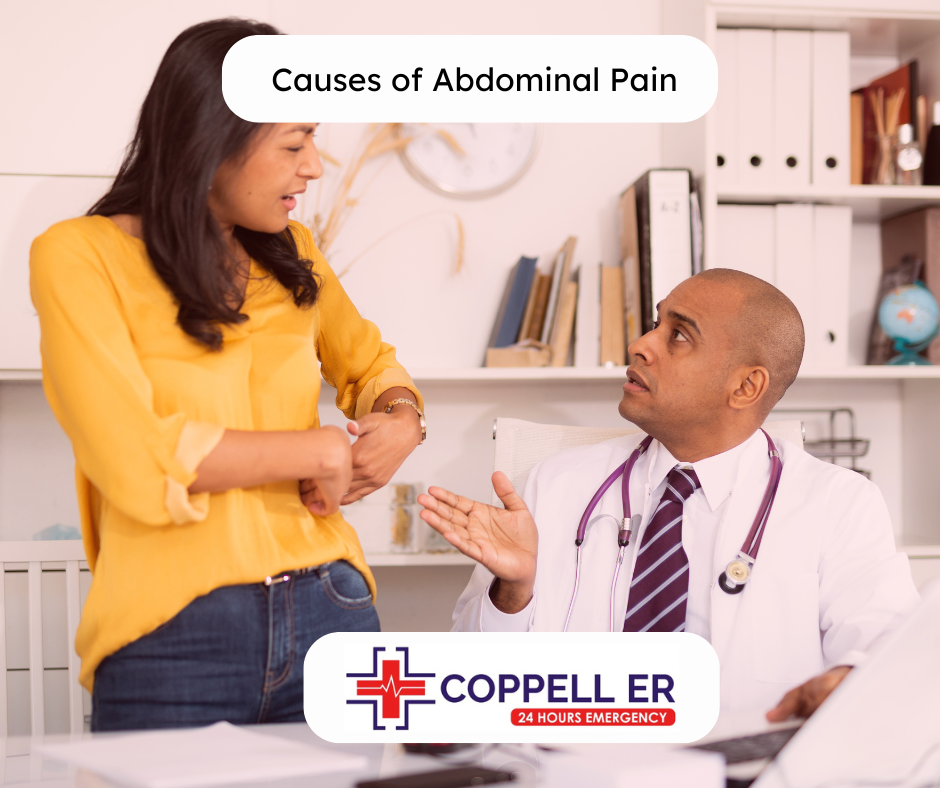
Whether you have a mild ache or serious cramps, abdominal pain can have many causes. Reasons for belly pain often include indigestion, constipation, a stomach virus, and menstrual cramps, most of which are not serious and will ease on their own.
Coping with stomach ache usually involves rest and simple remedies, but you should see a doctor if the pain is severe, persistent, or the cause is unknown.
The most common causes of abdominal pain can be classified into several groups. They are as follows:
Gastrointestinal Reasons
Abdominal pain can stem from gastrointestinal issues, including indigestion, gas discomfort, constipation, diarrhea, dietary sensitivities (like gluten intolerance), and food poisoning. These conditions usually cause temporary discomfort but can sometimes require prompt medical attention.
Inflammatory Reasons
Inflammatory conditions such as gastroenteritis (due to stomach flu), peptic ulcer disease, gastroesophageal reflux disease (GERD), and urinary tract infections (UTIs) can also lead to abdominal pain. These issues often involve inflammation of the digestive tract or urinary system.
Reproductive Pain in Women
Abdominal pain in women can be caused due to their reproductive health, including dysmenorrhea (severe period cramps), ovulation pain, ovarian cysts, and miscarriages. Women may also experience varying levels of discomfort due to endometriosis, ectopic pregnancies, and pelvic inflammatory disease. Reproductive pain in women often warrants a quick medical evaluation.
Serious Conditions
Severe stomach pain might indicate serious conditions such as organ rupture (e.g. appendix rupture), gallstones, kidney stones, or infections. These conditions can be life-threatening and require emergency care.
Location Based Causes
The location of the abdominal pain can often help pinpoint its cause. These include:
- Upper Abdominal Pain: Possible causes of upper abdominal pain include gallbladder stones, cardiac arrest, liver inflammation (hepatitis), or pneumonia.
- Middle Abdominal Pain: This can be caused by uremia (buildup of waste products in blood), injuries, gastroenteritis, and appendicitis.
- Lower Abdominal Pain: Sharp discomfort in the lower abdomen can be categorized by side:
- Lower Left Abdominal Pain: Causes include Crohn’s disease, cancer, kidney infections, ovarian cysts, and appendicitis.
- Upper Left Abdominal Pain: This can be attributed to an enlarged spleen, fecal impaction (hardened stool), injuries, kidney infections, heart attacks, or cancer.
- Lower Right Abdominal Pain: Potential causes are appendicitis, hernias, kidney infections, cancer, or flu.
- Upper Right Abdominal Pain: Pneumonia, hepatitis, injuries, or appendicitis may cause upper right abdominal pain.
Diagnosis of Abdominal Pain
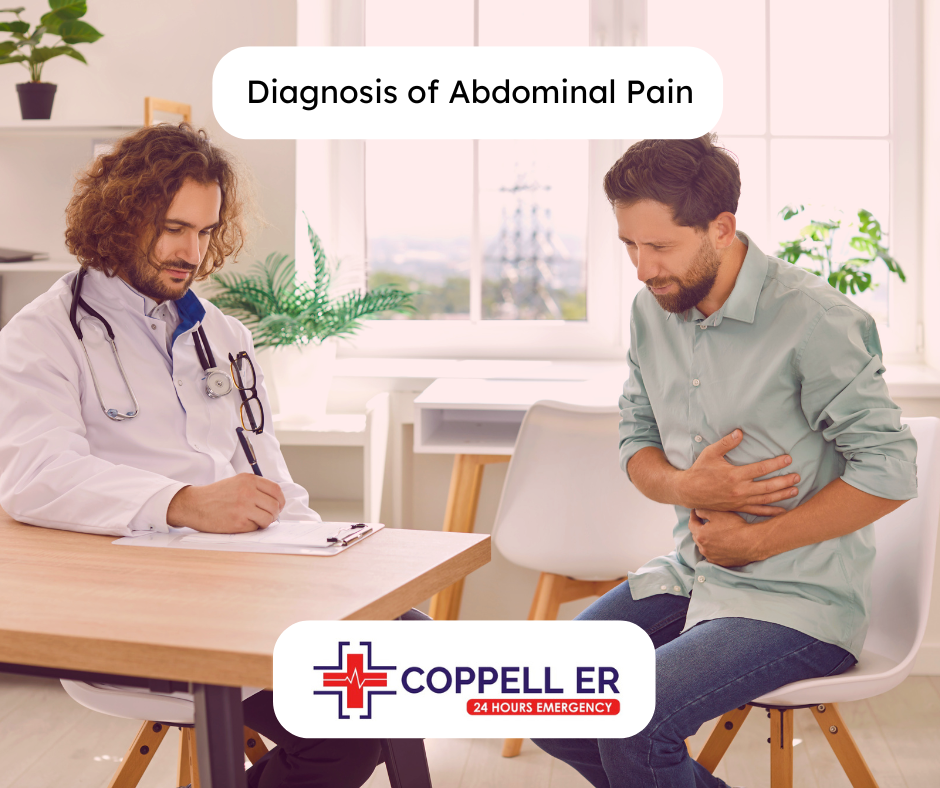
Abdominal pain diagnosis typically involves a series of tests and discussions with your doctor about your symptoms. Before ordering tests, your doctor will conduct a physical examination, including gently pressing on different areas of your abdomen to check for tenderness and swelling.
You’ll likely be asked several questions to help pinpoint the cause of your pain:
- Where exactly is the pain located?
- Has the pain always been in the same spot, or has it shifted?
- How intense is the pain?
- Is the pain constant, or does it come and go?
- Is the pain affecting your daily activities?
- What were you doing when the pain started?
- Is there a particular time of day when the pain is worse?
- When did you last have a bowel movement, and is it regular?
- Have you noticed any changes in your urine?
- Have there been any significant changes to your diet?
- If applicable, questions about sexual and menstrual history may be asked.
This information, combined with the severity and location of the pain, helps your doctor determine which tests to order.
Imaging tests such as MRI scans, ultrasounds, and X-rays provide detailed views of abdominal organs, aiding in the diagnosis of tumors, fractures, ruptures, and inflammation.
Additional diagnostic procedures may include:
- Colonoscopy (to examine the colon and intestines)
- Endoscopy (to identify abnormalities in the esophagus and stomach)
- Upper GI (a specialized X-ray test using contrast dye to detect growths, ulcers, inflammation, and blockages in the stomach)
Furthermore, blood, urine, and stool samples may be analyzed to detect bacterial, viral, or parasitic infections.
Effective Treatment
While the diagnosis of abdominal pain typically shapes the treatment you receive, it’s pertinent to note that mild cases often resolve on their own. For example, if you’re experiencing discomfort from gas or bloating, it may simply need time to pass.
However, in some cases, visiting a doctor is necessary. If you’re experiencing severe abdominal pain and require immediate assistance, the Coppell Emergency Room offers comprehensive care and support you need to get back to feeling your best.
Not all types of abdominal pain are avoidable. However, you can reduce the chance of experiencing abdominal discomfort by considering a few lifestyle changes like:
- Maintaining a nutritious diet
- Staying hydrated
- Engaging in regular exercise
- Consuming smaller meals
If you’ve a gastrointestinal condition such as Crohn’s disease, adhere to the dietary guidelines provided by your doctor to alleviate discomfort. If you suffer from GERD, refrain from eating within 2 hours of bedtime.
Reclining shortly after eating could lead to heartburn and abdominal discomfort. Aim to wait at least 2 hours after eating before lying down.
Key Takeaway
If you’re experiencing abdominal pain, it’s crucial not to jump to conclusions because it’s often not serious. Speak with your doctor if the pain is chronic or progressive. For severe abdominal pain, we advise consulting local abdominal pain specialists to identify the cause and begin appropriate treatment.
Remember, understanding the nature of your abdominal pain is the first step towards effective care. For urgent care and peace of mind, visit our emergency room in Coppell, TX to diagnose and treat your stomach ache.
Whether it’s mild stomach pain or a life-threatening condition, our team of highly skilled and certified physicians and nurses is available 24/7 to bring you urgent relief, with minimal or no wait time.
FAQs
How to relieve abdominal pain?
To ease abdominal pain, make sure you’re well-hydrated by drinking plenty of water and clear fluids. Cut back on coffee, tea, and alcohol, as these can aggravate the discomfort.
When you’re ready to eat again, begin with clear liquids before gradually reintroducing simple, bland foods like crackers, rice, bananas, or toast. Your doctor may recommend additional digestive pain treatment options to manage abdominal pain effectively.
What can cause pain in the lower abdomen?
Lower abdominal pain can be caused by various digestive issues, such as indigestion, gas, constipation, or food allergies that affect the normal functioning of your digestive system.
Discomfort in the lower abdomen may also arise if there is inflammation in your intestines, triggered by activation of the immune system.
What causes lower right abdominal pain in females?
Lower right abdominal pain in females may be caused by conditions such as ovarian cysts, appendicitis, or pelvic inflammatory disease.
What is the most common cause of abdominal pain?
Common stomach discomfort causes vary and can include indigestion, gas, overeating, consuming spicy or fatty foods, stress, anxiety, or certain medications. Identifying the specific cause is crucial for finding effective relief.
References:
McQuaid KR. Approach to the patient with gastrointestinal disease. In: Goldman L, Schafer AI, eds. Goldman-Cecil Medicine. 26th ed. Philadelphia, PA: Elsevier; 2020:chap 123.
Landmann A, Bonds M, Postier R. Acute abdomen. In: Townsend CM Jr, Beauchamp RD, Evers BM, Mattox KL, eds. Sabiston Textbook of Surgery. 21st ed. St Louis, MO: Elsevier; 2022:chap 46.
Smith KA. Abdominal pain. In: Walls RM, Hockberger RS, Gausche-Hill M, eds. Rosen’s Emergency Medicine: Concepts and Clinical Practice. 9th ed. Philadelphia, PA: Elsevier; 2018:chap 24.
Weber F. Gastrointestinal and hepatic manifestations of systemic diseases. In: Feldman M, Friedman LS, Brandt LJ, eds. Sleisenger and Fordtran’s Gastrointestinal and Liver Disease. 11th ed. Philadelphia, PA: Elsevier; 2021:chap 37.

